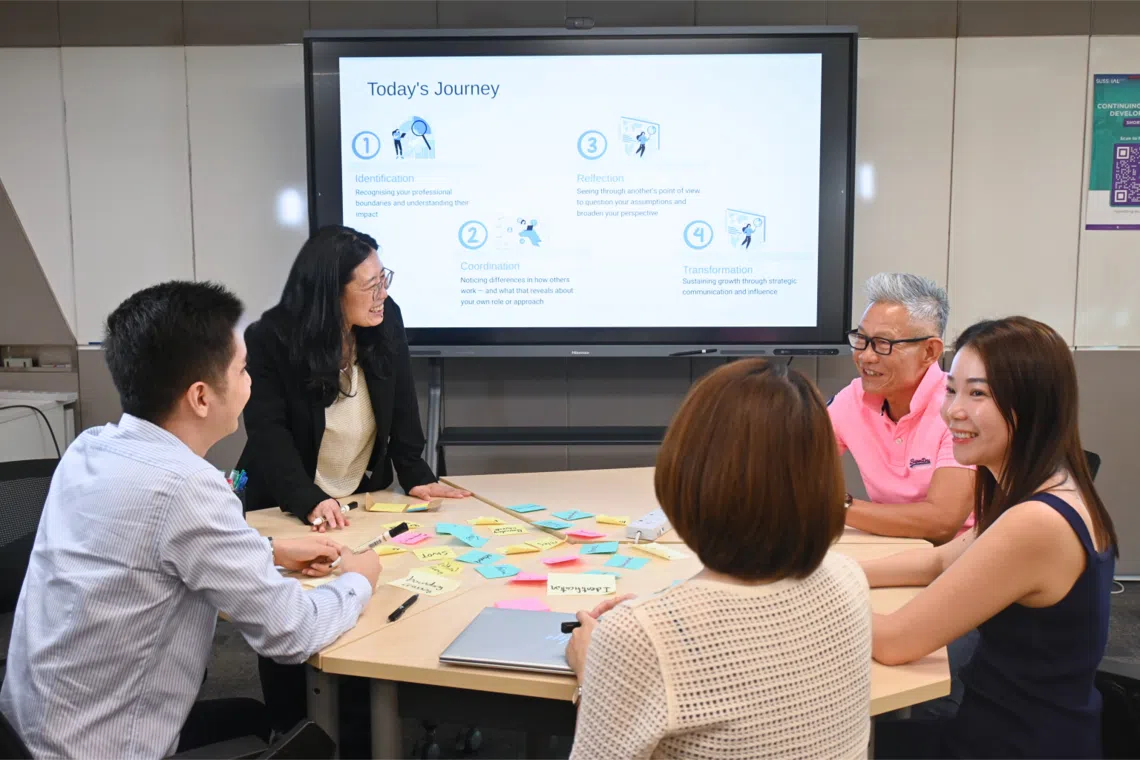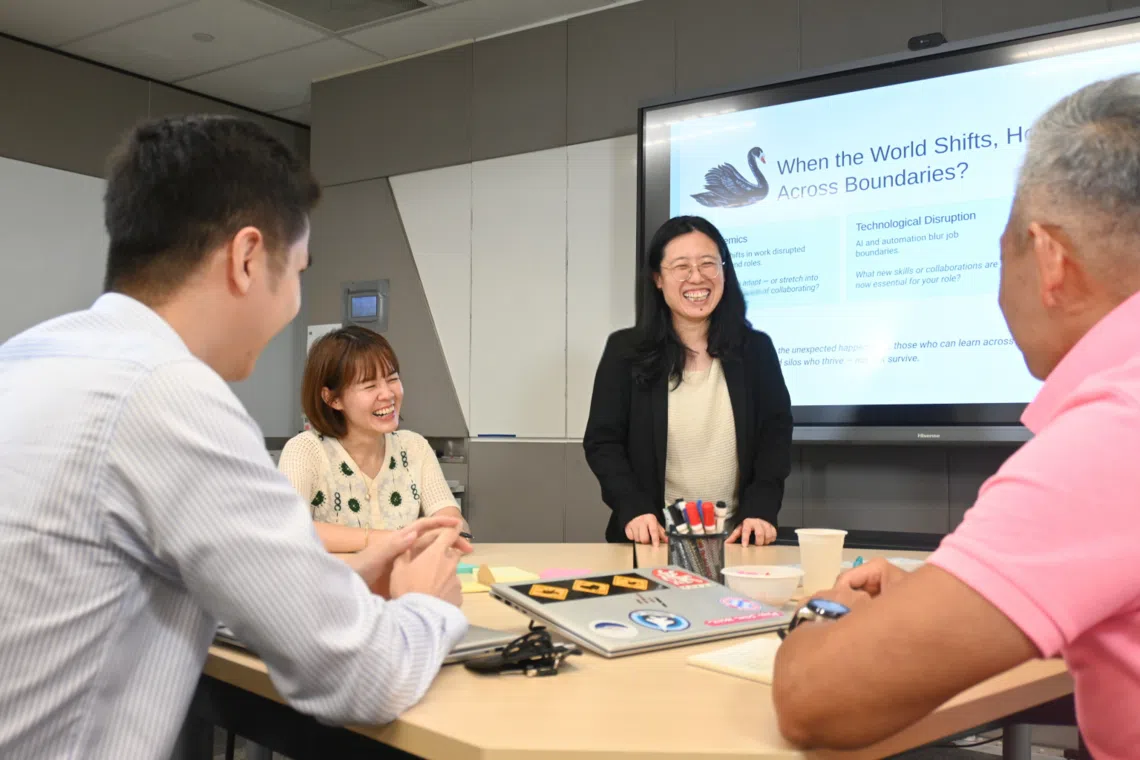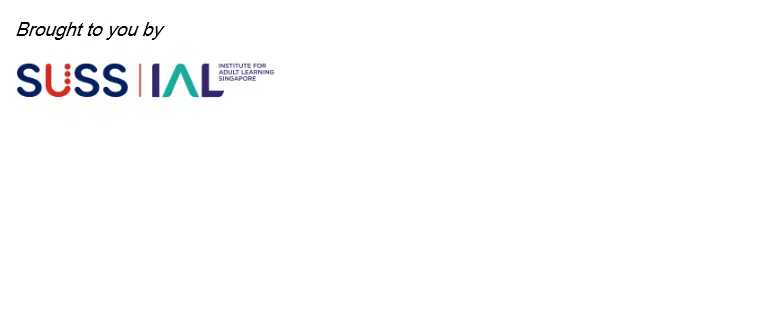Branded content
Building career resilience: Why strengthening the adaptability muscle matters for the future of work
The Graduate Diploma in Adult Learning programme helps professionals sharpen their ability to navigate change and lead transformation at any stage of their careers

The GDALL class size is kept small and interactive to encourage active participation and peer learning.
PHOTO: SUSS-IAL
Just as athletes train to perform at peak levels, professionals today need to build a different kind of “muscle” – the ability to learn, adapt and pivot quickly. Like any other skill, adaptability can be built and strengthened through practice.
This is what Dr Tay Wan Ying, who has close to 20 years of experience in adult learning and leadership, believes to be essential in today’s evolving work ecosystem. “Learning is a way of building that (adaptability) ‘muscle’. It allows one to be ready when change is needed,” she said.
Dr Tay is the head of programme for the Graduate Diploma in Adult Learning (GDALL) and the Master in Boundary-Crossing Learning and Leadership (MBX) at the Institute for Adult Learning (IAL), an autonomous institute of the Singapore University of Social Sciences (SUSS).
The GDALL is designed to arm professionals with enhanced skills and mindsets to navigate changes at work.
Launched in 2024 by SUSS-IAL, with its first intake in Jan 2025, the programme targets adult educators, learning and development (L&D) specialists, human resource (HR) business partners and line leaders – professionals who are already engaged in learning-related work and who see learning as part of organisational growth. It also benefits learners from the continuing education and training space who are looking for fresh ways to motivate other adult learners.
“The GDALL was created to support those who are already doing learning-related work but who want to do it with greater clarity and structure,” said Dr Tay.

GDALL course participants learn how to connect insights across functions, bridge differing perspectives and solve real workplace problems using boundary-crossing techniques and tools.
PHOTO: SUSS-IAL
How work has changed
What is driving the growing need for this kind of adult learning? The very nature of work itself has changed amid shifting business priorities, globalisation and technology.
“The way people are connected and how work now crosses functional, technological, cultural and even mindset boundaries has fundamentally changed,” explained Dr Tay. “Modern workplaces bring together teams with different goals, norms and tools, and navigating these intersections requires strong boundary-crossing capabilities.”
As organisations adapt to these changes, roles and required skill sets have also shifted. Dr Tay noted that there is now a greater need for data-driven thinking, business acumen and purpose-driven work.
“Work today is increasingly tied to purpose – what really drives us,” she added. “When people reflect on these questions, they often realise that purpose is shaped not just by what they do, but by how they work across different functions, priorities and viewpoints. Being able to bridge these everyday boundaries is now a key skill for meaningful and effective work.”
In this new environment, professionals must develop the agility and mindset together with the adaptability “muscle” to continually learn and grow.
What this means for learning and development
From a L&D perspective, it is no longer enough to simply schedule training courses or update curriculum plans. Instead, L&D professionals should act as catalysts for transformation, enabling people and organisations to be better equipped to respond to changing priorities, mentioned Dr Tay.
“Many L&D professionals and trainers we’ve spoken to find themselves facing this question: How do we connect the skills that we develop in our people to the business outcomes that our organisations want to see?” she said. “At the same time, they may sometimes lack the framework or language to do this well and convincingly.”
The GDALL structure at a glance
Designed with working professionals in mind, the Graduate Diploma in Adult Learning (GDALL)
After completing the GDALL, learners can opt to continue with the Master in Boundary-Crossing Learning and Leadership (MBX) programme
The programme stays current through input from industry partners and mentors via the Programme Advisory Committee.
What learning looks like in a GDALL classroom
In a GDALL classroom, participants learn to view their workplace as a connected system, where people, processes and mindsets constantly interact. By examining where boundaries create friction and learning how to bridge them, they are able to bring back solutions that make everyday work smoother and more effective.
An example would be an assignment on redesigning onboarding processes, where learners worked on rethinking how best to induct new employees into their organisations. “We do not separate learning from work – we use work as the basis of learning. This aligns with our philosophy at IAL, where we believe adults learn best through connecting learning with their workplace realities,” Dr Tay explained.
Unlike traditional seminar-heavy courses, classes are kept small and interactive to foster active participation, peer learning and reflection. Expect lively group discussions, debates, roleplays and presentations, rather than lecture-focused sessions. Additionally, the GDALL course is a flexible programme and offers a modular stackable pathway.

Learners in the inaugural GDALL were mostly mid-career professionals navigating career pivots or taking on new responsibilities.
PHOTO: SUSS-IAL
“Every session is designed to count,” said Dr Tay. “We don’t want learners to just come in to listen to a lecture, but we want them to be actively involved, invested and highly engaged in their learning, so we’ve designed the pedagogies in a way that allows learners to hear and learn from one another.”
Dr Tay shared that assignments are also designed to be practical and applicable to the learners’ work situations. For instance, someone working on a change management initiative at work can choose to submit their project in a format that works for them, such as a presentation or a recorded video, supported by transcripts.
“We recognise that not all adult learners are keen on academic writing,” Dr Tay noted. “Working with different assignment formats also equips them to use similar approaches in their workplaces, so that they are not confined to written reports as a way to showcase data.”
Train the mentor
The inaugural GDALL cohort brought together a range of learners, mostly mid-career professionals in their 30s and 40s navigating career pivots or taking on new responsibilities, shared Dr Tay. Some come from technical roles and are transitioning into HR or L&D, while others are lecturers branching into continuing education.
All of them share a common goal: to make learning and development more meaningful for themselves and the organisations they are in.
Dr Tay recounted a particularly inspiring learner she met in her current cohort: a 65-year-old finance professional, who is living proof that the adaptability “muscle” can be strengthened at any stage in life.
“What I understand from this student is that she wants to pay it forward in the next phase of her career. For some people, it’s no longer just about themselves, but about becoming a mentor and coach to others. And to do that well, the student recognised that she had to learn about adult pedagogies, something new to her as she was in finance,” said Dr Tay.
To Dr Tay, this student – along with the other dedicated adult learners in the programme – is a reminder that adult learning is not about “clocking hours” to collect credentials, but building the ability to adapt, lead and uplift others.
Learn more about the GDALL programme here Register your interest here



